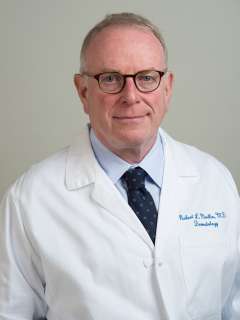
Robert Modlin, MD
Specialty
Institutional Affiliation
Languages
Education
Internship
Degree
Residency
Board Certification
Contact Information
Clinical Interests
Scientific Interests
Infectious disease poses a major health problem worldwide. Essential to the control of these diseases is the elucidation of immune mechanisms which result in resistance versus susceptibility to infection. Dr. Robert Modlin's laboratory focuses on the identification of novel mechanisms by which the innate and adaptive immune system combat microbial pathogens.
Mammalian Toll-like receptors comprise part of the innate response. The researchers study the microbial ligands that activate Toll-like receptors and the functional consequence of Toll activation. Modlin and his colleagues are interested in the mechanism by which Toll activation influences the adaptive T-cell response, the mechanisms by which Toll activation leads to direct antimicrobial pathways and role of Toll like receptors in causing tissue injury in disease. The adaptive T-cell response recognizes peptide antigens in the context of MHC molecules and lipid antigens presented by CD1 molecules. The researchers are identifying novel peptide and lipid antigens that are immunodominant in the human immune response to infection as well as mechanisms by which these T-cells can directly kill the foreign invader. Using the knowledge of these antigen presentation pathways, the researchers are engineering new vaccine strategies against these pathogens. It is hoped that the insights obtained from these studies will lead to better treatments and prevention of infectious diseases in humans.
Highlighted Publications
Liu PT, Krutzik SR, Modlin RL. Therapeutic implications of the TLR and VDR partnership. Trends Mol Med. 2007; 13(3): 117-24.
Miller LS, Modlin RL. Human keratinocyte Toll-like receptors promote distinct immune responses. J Invest Dermatol. 2007; 127(2): 262-3.
Modlin R. The vitamin D receptor and its role in inflammation and host defence: interview with Dr Robert Modlin by Emma Quigley. Expert Opin Ther Targets. 2007; 11(4): 431-3.
Schauber J, Dorschner RA, Coda AB, Buchau AS, Liu PT, Kiken D, Helfrich YR, Kang S, Elalieh HZ, Steinmeyer A, Zugel U, Bikle DD, Modlin RL, Gallo RL. Injury enhances TLR2 function and antimicrobial peptide expression through a vitamin D-dependent mechanism. J Clin Invest. 2007; 117(3): 803-11.
Sieling PA, Legaspi A, Ochoa MT, Rea TH, Modlin RL. Regulation of human T-cell homing receptor expression in cutaneous bacterial infection. Immunology. 2007; 120(4): 518-25.